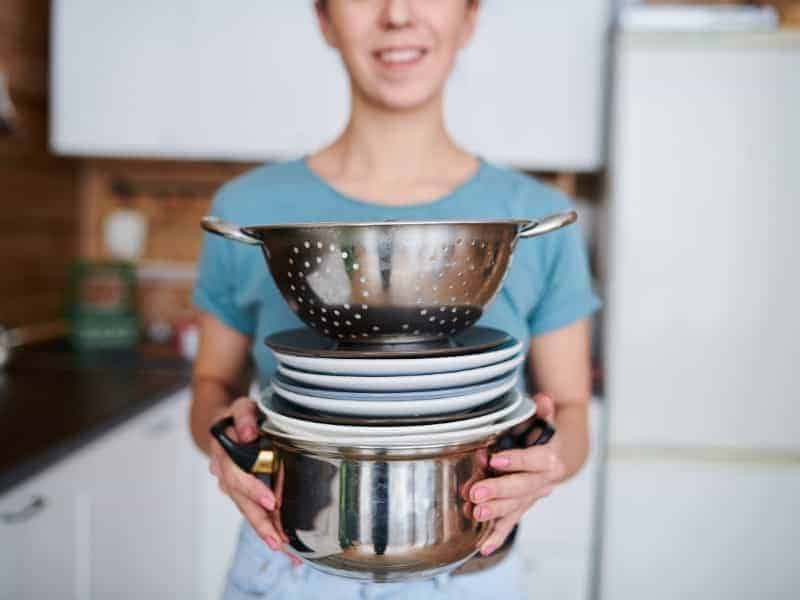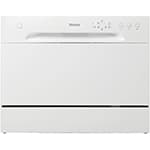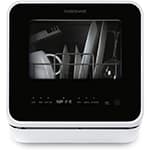Clean dishes and utensils are critical to family wellbeing. Whenever you have a meal, or host a dinner party, or use dishes and utensils to serve food, you have to make sure that they are rinsed, cleaned thoroughly and then, dried.
Different bacteria, even the most dangerous ones, could grow on dishes and utensils that have been left for days after use. Harmful microorganisms such as E.Coli, Salmonella, and Listeria, may be found on kitchen items that are regularly used for food preparation and storage.
Messy dishes, utensils, and food scrap that have been sitting in the kitchen for too long may potentially attract cockroaches, mice, and hundreds of different kinds of disgusting bugs!
Why Cleaning Dishes is Important?
Cleaning dishes are important because it prevents the growth of bacteria in your kitchen. It also makes your kitchen visually appealing and puts a stop to any odors that may result from unclean dishes. Additionally, your kitchen will look and feel organized if you clean your dishes regularly.
Table of Contents
Why is it so Important to Clean Dishes in Everyday Life?

People often host huge parties at home or invite close friends and families for a fun hangout. This results in consumption of different kinds of food with many ingredients.
The outcome is often disappointing. Piles and piles of unwashed, dirty, and unhygienic dishes and utensils pile up in the kitchen sink!
The vast majority have at some stage, put off, the mundane and boring task of cleaning up their dishes and utensils for a day or two. Occasionally, they leave it out for much longer.
That forever-growing heap of unsanitary cutlery is accumulating huge loads of microorganisms while it just sits there in the sink. Stalling the boring errand is truly not justified when decaying food sitting in your sink begins to draw in rodents and vermin.
To add to your troubles, your kitchen might start to smell like a dumpster from all the rancid and rotten food. All of these problems could be solved if the dishes were done in everyday life after using them.
The more time these messy dishes sit in the sink, the greater amount of the time microorganisms have to duplicate. A high accumulation of microorganisms pulls in undesirable guests, for example, rodents, fruit flies, houseflies, mice, and cockroaches.
The problem will get even worse as time goes by! The longer and more you let the nasty and disgusting dishes, utensils pile up, the more time-consuming, and difficult it will be for you to clean them when you finally decide to do so.
One thing you can do is rinse the dirty dishes off after having the meals so that it does not harden and forms a crust that is difficult to remove! You would be saving yourself a lot of time, effort, energy, and money by keeping your dishes free of dirt and spotless.
With dried up, solidified stains, washing your dishes requires more soap and water than cleaning them immediately after using them. This uses a huge amount of energy.
In addition, your water bill may go up dramatically. Slacking to do the dishes and allowing them to pile up will cost you even more spare time too.
Washing the dishes regularly makes sure your kitchen looks gorgeous and in pristine condition for whenever you want to step in and cook something quickly or prepare a nice long dinner. It will also ensure you have the cleanest plates and utensils for when you have to eat something in a time crunch.
These are the main reasons why it is so important to clean dishes in everyday life. We hope this helps you and compels you to wash your unclean dishes timely!
What are the Benefits of Cleaning Dishes Properly?
Stress is decreased when you wash dishes by hand, not just that, when you accomplish this work by meditating, positive energy comes forth in your brain, which likewise improves the body alongside your psyche.
This special phenomenon is known as mindfulness and it has been linked with researches, showing that it might even boost your immune system in the process.
One other benefit of cleaning dishes properly could be the fact that all harmful bacteria are removed from your kitchen. This also prevents rodents and pests from building up in your kitchen.
Washing dishes and utensils regularly also aids in the visuals of your kitchen. It fends off all the possible stale and putrid smells that may result from a pile of unclean dishes.
What Happens When You Don’t Wash Dishes?
If you don’t wash your dishes regularly, you might want to start now, given that there could be a LOT of issues that arise from unclean dishes. For starters, it makes your kitchen look disgusting and unpleasant for your eyes.
Secondly, harmful bacteria could grow and multiply in the mold, that might pose health risks to you and your family.
The leftover food stains from the unclean dishes could attract unwanted visitors such as mice, cockroaches, etc. This might result in threatening germs being spread all over the house.
If left for too long, the food in the dishes could solidify, forming crusty stains that may take a lot of extra effort to get rid of. Higher water bills, greater consumption of your time and energy are just two of the things that may result from this nuisance.
How Often Should You Wash Dishes?
Generally, you should not leave the dirty dishes sitting around for too long, but if you have limited energy and are prone to becoming overly tired, go easy on yourself.
Wash messy dishes at least once a day if you are hand washing them. This will keep food from getting dried on and difficult to wash off. Also, it prevents the development of microbes and parasites in the residual food particles and shields them from drawing in bugs and different vermin.
Washing your unclean dishes after a meal or after a cooking session could be an effective way to prevent dishes from piling up and maintaining a specific routine for your own comfort and peace of mind.
What is the Fastest Way to Wash Dishes by Hand?
It may seem that soaking your dishes increases the time it takes to wash dishes, but it actually makes life much easier and your dishwashing experience a joy as it loosens the food particles, enabling you to quickly scrub and rinse them off.
You can use hot water and dish soap to remove leftover food and grease from your dishes. Make sure you are wearing gloves in order to withstand the high temperature of the water that is required to remove the bacteria.
The fastest way to go by washing dishes is to put them in order, that is, start with the smallest such as glasses and cups, followed by larger items such plates, serving bowls, etc., and finally the dirtiest items, which are generally the pots and pans.
NEVER let dishes stack up on your sink. If there are piles of dishes and utensils in your sink, it will greatly increase the time required to clean as it disorganizes everything and requires shifting from one place to another.
Dish Cleaning Essentials Everyone Must Have:
Is it Ok to Leave Dirty Dishes Overnight?
More often than not, it is NOT okay to leave dirty dishes overnight. Dishes left in the sink often have leftover food, which will definitely attract insects and rodents. It will also prove to be a breeding ground for bacteria, which may result in various diseases.
Another reason to not leave dirty dishes overnight could be the fact that you might not like waking up to make breakfast in a kitchen that reeks of rotten food and is a complete mess from the unclean dishes.
Although, if you had a long day, you might be excused from doing the dishes that night but it is generally encouraged to never let dirty dishes pile up overnight!
How to Make Cleaning Dishes Easier?
The best way to make cleaning dishes easier is to do them in a certain order. You should always soak the greasy pots and pans and then work your way through the smaller items such as cups and plates, followed by service dishes and bowls.
Having a container with some warm water and dish soap beforehand will make it easier for you to scrub off food particles from dishes.
Keep your dirty dishes in designated bins instead of piling up on the sink. This will make sure your kitchen sink is not messy and you can work through the dishes in an organized manner.
Budget-Friendly Small Dishwashers that We Love:
Do Cleaning Services Wash Dishes?
Cleaning services generally do not wash dishes. Rather, they focus on other household cleaning chores such as dusting, mopping, etc. However, they do unload and load dishwashers, if you have one.
For some extra money though, they can clean your dishes and utensils.
This feature explains why you might need to clean dishes on a regular basis for a healthy, clean household! It might seem like a small issue, but cleaning dishes and not letting them pile up in the sink is a very important household chore as explained.









